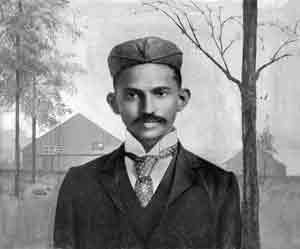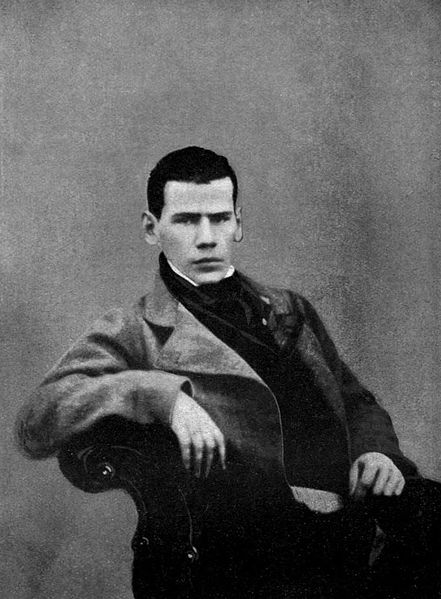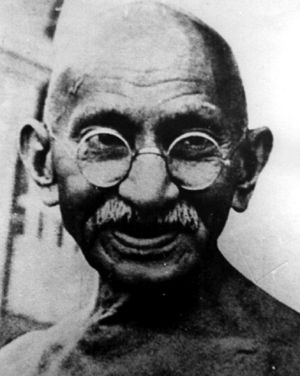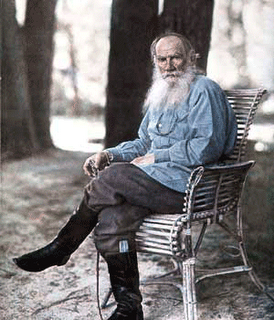In 1908, Tolstoy wrote A Letter to a Hindoo outlining his belief in non-violence as a means for India to gain independence from British colonial rule. In 1909, a copy of the letter fell into the hands of Mohandas Gandhi who was working as a lawyer in South Africa at the time and in the beginnings of becoming an activist. Tolstoy’s letter was significant for Gandhi who wrote to the famous writer seeking proof that he was the real author, leading to further correspondence between them. Reading Tolstoy’s The Kingdom of God is Within You also convinced Gandhi to avoid violence and espouse nonviolent resistance, a debt Gandhi acknowledged in his autobiography, calling Tolstoy “the greatest apostle of non-violence that the present age has produced”. The correspondence between Tolstoy and Gandhi would only last a year, from October 1909 until Tolstoy’s death in November 1910, but led Gandhi to give the name, the Tolstoy Colony, to his second ashram in South Africa.
Leo Tolstoy and Mohandas K. Gandhi

Letter from M. K. Gandhi, 1-10-1909
Westminster Palace Hotel
4, Victoria Street,
LONDON, W.C.
10.11.1909.
Dear Sir:
I beg to tender my thanks for your registered letter in connection with the letter addressed to a Hindu, and with the matters that I dealt with in my letter to you.
Having heard about your failing health I refrained in order to save you the trouble, from sending an acknowledgment, knowing that a written expression of my thanks was a superfluous formality, but Mr. Aylmer Maude, whom I have now been able to meet reassured me that you were keeping very good health indeed and that unfailingly and regularly attended to your correspondence every morning. It was very gladsome news to me, and it encourages me to write to you further about matters which are, I know, of the greatest importance according to your teaching.
I beg to send you herewith a copy of a book written by a friend – an Englishman, who is at present in South Africa, in connection with my life, insofar as it has a bearing on the struggle with which I am so connected, and to which my life is dedicated. As I am very anxious to engage your active interest and sympathy I thought that it would not be considered by you as out of the way for me to send you the book.
In my opinion, this struggle of the Indians in the Transvaal is the greatest of modern times, inasmuch as it has been idealised both as to the goal as also the methods adopted to reach the goal. I am not aware of a struggle, in which the participators are not to derive any personal advantage at the end of it, and in which 50 % of the persons affected have undergone great suffering and trial for the sake of a principle. It has not been possible for me to advertise the struggle as much as I should like. You command, possibly, the widest public today. If you are satisfied as to the facts you will find set forth in Mr. Doke’s book, and if you consider that the conclusions I have arrived at are justified by the facts, may I ask you to use your influence in any manner you think fit to popularise the movement? If it succeeds, it will be not only a triumph of religion, love and truth over irreligion, hatred and falsehood, but it is highly lilely to serve as an example to the millions in India and to people in other parts of the world who may be down-trodden, and will certainly go a great way towards breaking up the party of violence, at least in India. If we hold out to the end, as I think we would, I entertain not the slightest doubt as to the ultimate success; and your encouragement in the way suggested by you can only strengthen us in our resolve.
The negociations [sic] that were going on for a settlement of the question have practically fallen through, and together with my colleague I return to South Africa this week, and invite imprisonment. I may add that my son has happily joined me in this struggle, and is now undergoing imprisonment with hard labour for six months. This is his fourth imprisonment in the course of the struggle.
If you would be so good as to reply to this letter, may I ask you to address your reply to me at Johannesburg, S.A. Box 6522.
Hoping that this will find you in good health, I remain
Your obedient servant,
M K Gandhi
To Gandhi,
I HAVE just received your very interesting letter, which gave me much pleasure. God help our dear brothers and co-workers in the Transvaal! Among us, too, this fight between gentleness and brutality, between humility and love and pride and violence, makes itself ever more strongly felt, especially in a sharp collision between religious duty and the State laws, expressed by refusals to perform military service. Such refusals occur more and more often.
I wrote the ‘Letter to a Hindu’, and am very pleased to have it translated. The Moscow people will let you know the title of the book on Krishna. As regards ‘re-birth’ I for my part should not omit anything, for I think that faith in a re-birth will never restrain mankind as much as faith in the immortality of the soul and in divine truth and love. But I leave it to you to omit it if you wish to. I shall be very glad to assist your edition. The translation and diffusion of my writings in Indian dialects can only be a pleasure to me.
The question of monetary payment should, I think, not arise in connexion with a religious undertaking.
I greet you fraternally, and am glad to have come in touch with you.
LEO TOLSTOY.
To Count Leo Tolstoy, Yasnaya Polyana, Russia.
JOHANNESBURG, 4th April 1910.
Dear Sir,
You will recollect my having carried on correspondence with you whilst I was temporarily in London. As a humble follower of yours, I send you herewith a booklet which I have written. It is my own translation of a Gujrati writing. Curiously enough, the original writing has been confiscated by the Government of India. I, therefore, hastened the above publication of the translation.
I am most anxious not to worry you, but, if your health permits it and if you can find the time to go through the booklet, needless to say I shall value very highly your criticism of the writing.
I am sending also a few copies of your letter to a Hindoo, which you authorised me to publish. It has been translated in one of the Indian languages also.
I am,
Your obedient servant, M. K. GANDHI.
To Mahatma Gandhi.
YASNAYA POLYANA. 8th May 1910.
Dear friend,
I have just received your letter and your book, Indian Home Rule.
I read your book with great interest because I think the question you treat in it: the passive resistance — is a question of the greatest importance, not only for India but for the whole humanity.
I could not find your former letters, but came across your biography by J. Doss, which too interested me much and gave me the possibility to know and understand your letter.
I am not quite well at present and therefore abstain from writing to you all what I have to say about your book and all your work, which I appreciate very much, but I will do it as soon, as I will feel better.
Your friend and brother
Leo Tolstoy
To Gandhi, Johannesburg, Transvaal, South Africa.
KOCHETY. 7th September 1910.
I received your journal, Indian Opinion, and was glad to see what it says of those who renounce all resistance by force, and I immediately felt a wish to let you know what thoughts its perusal aroused in me.
The longer I live-especially now when I clearly feel the approach of death-the more I feel moved to express what I feel more strongly than anything else, and what in my opinion is of immense importance, namely, what we call the renunciation of all opposition by force, which really simply means the doctrine of the law of love unperverted by sophistries. Love, or in other words the striving of men’s souls towards unity and the submissive behaviour to one another that results therefrom, represents the highest and indeed the only law of life, as every man knows and feels in the depths of his heart (and as we see most clearly in children), and knows until he becomes involved in the lying net of worldly thoughts. This law was announced by all the philosophies- Indian as well as Chinese, and Jewish, Greek and Roman. Most clearly, I think, was it announced by Christ, who said explicitly that on it hang all the Law and the Prophets. More than that, foreseeing the distortion that has hindered its recognition and may always hinder it, he specially indicated the danger of a misrepresentation that presents itself to men living by worldly interests- namely, that they may claim a right to defend their interests by force or, as he expressed it, to repay blow by blow and recover stolen property by force, etc., etc. He knew, as all reasonable men must do, that any employment of force is incompatible with love as the highest law of life, and that as soon as the use of force appears permissible even in a single case, the law itself is immediately negatived. The whole of Christian civilization, outwardly so splendid, has grown up on this strange and flagrant- partly intentional but chiefly unconscious-misunderstanding and contradiction. At bottom, however, the law of love is, and can be, no longer valid if defence by force is set up beside it. And if once the law of love is not valid, then there remains no law except the right of might. In that state Christendom has lived for 1,900 years. Certainly men have always let themselves be guided by force as the main principle of their social order. The difference between the Christian and all other nations is only this: that in Christianity the law of love had been more clearly and definitely given than in any other religion, and that its adherents solemnly recognized it. Yet despite this they deemed the use of force to be permissible, and based their lives on violence – so that the life of the Christian nations presents a greater contradiction between what they believe and the principle on which their lives are built: a contradiction between love which should pre scribe the law of conduct, and the employment of force, recognized under various forms-such as governments, courts of justice, and armies, which are accepted as necessary and esteemed. This contradiction increased with the development of the spiritual life of Christianity and in recent years has reached the utmost tension.
The question now is, that we must choose one of two things-either to admit that we recognize no religious ethics at all but let our conduct of life be decided by the right of might; or to demand that all compulsory levying of taxes be discontinued, and all our legal and police institutions, and above all, military institutions, be abolished.
This spring, at a scripture examination in a Moscow girls’ school, first their religious teacher and then an archbishop who was also present, questioned the girls on the ten commandments, especially on the sixth. After the commandments had been correctly recited the archbishop sometimes put a question, usually: ‘Is it always and in every case forbidden by the law of God to kill?’ And the unfortunate girls, misled by their instructor, had to answer and did answer: ‘Not always, for it is permissible in war and at executions.’ When, however, this customary additional question-whether it is always a sin to kill-was put to one of these unfortunate creatures (what I am telling you is not an anecdote, but actually happened and was told me by an eyewitness) the girl coloured up and answered decidedly and with emotion – ‘Always!’ And despite all the customary sophistries of the archbishop, she held steadfastly to it-that to kill is under all circumstances forbidden even in the Old Testament, and that Christ has not only forbidden us to kill, but in general to do any harm to our neighbour. The archbishop, for all his majesty and verbal dexterity,was silenced, and victory remained with the girl.
Yes, we may write in the papers of our progress in mastery of the air, of complicated diplomatic relation, of various clubs, of discoveries, of all sorts of alliances, and of so-called works of art, and we can pass lightly over what that girl said. But we cannot completely silence her, for every Christian feels the same, however vaguely he may do so. Socialism, Communism, Anarchism’ Salvation Armies, the growth of crime, freedom from toil, the increasingly absurd luxury of the rich and increased misery of the poor, the fearfully rising number of suicides-are all indications of that inner contradiction which must and will be resolved. And, of course, resolved in such a manner that the law of love will be recognized and all reliance on force abandoned. Your work in the Transvaal, which to us seems to be at the end of the earth, is yet in the centre of our interest and supplies the most weighty practical proof, in which the world can now share, and not only the Christian but all the peoples of the world can participate.
I think it will please you to hear that here in Russia, too, a similar movement is rapidly attracting attention, and refusals of military service increase year by year. However small as yet is with you the number of those who renounce all resistance by force, and with us the number of men who refuse any military service-both the one and the other can say: God is with us, and God is mightier than man.
In the confession of Christianity-even a Christianity deformed as is that taught among us-and a simultaneous belief in the necessity of armies and preparations to slaughter on an ever-increasing scale, there is an obvious contradiction that cries to heaven, and that sooner or later, but probably quite soon, must appear in the light of day in its complete nakedness. That, however, will either annihilate the Christian religion, which is indispensable for the maintenance of the State, or it will sweep away the military and all the use of force bound up with it-which the State needs no less. All governments are aware of this contradiction, your British as much as our Russian, and therefore its recognition will be more energetically opposed by the governments than any other activity inimical to the State, as we in Russia have experienced and as is shown by the articles in your magazine. The governments know from what direction the greatest danger threatens them, and are on guard with watchful eyes not merely to preserve their interests but actually to fight for their very existence.
Yours etc., LEO TOLSTOY.




Pingback: Correspondence between Tolstoy and Gandhi | Felix Howard – Kingdom of God Worship Blogs